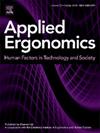The impact of psychological factors on interprofessional team collaboration in the ICU: A macro-ergonomic case study
IF 3.4
2区 工程技术
Q2 ENGINEERING, INDUSTRIAL
引用次数: 0
Abstract
This cross-sectional study investigates the influence of mental well-being and conflict recognition on a team performance-related measure, interprofessional collaborative practice, of medical residents in the intensive care unit. Utilizing a sample of 44 residents from diverse demographics, we analyzed the descriptive statistics and linear regression coefficients. Results reveal significant relationships between baseline stress and anxiety levels on individual performance, with higher baseline stress correlating with decreased performance across interprofessional collaborative practice, while higher anxiety levels were associated with improved interprofessional collaborative practice. Furthermore, conflict awareness emerged as a determinant of interprofessional collaborative practice. These findings underscore the importance of addressing personal traits and psychological health factors in optimizing team performance within ICU settings, one of the primary goals of macro-ergonomics. Implementing strategies for improving interprofessional collaboration is essential for establishing a shared understanding of optimal critical care practices and effective teamwork and communication.
心理因素对重症监护室跨专业团队合作的影响:宏观人体工程学案例研究
本横断面研究调查心理健康和冲突认识对团队绩效相关措施的影响,跨专业合作实践,在重症监护病房的医疗居民。利用44个不同人口统计的居民样本,我们分析了描述性统计和线性回归系数。结果显示,基线压力和焦虑水平对个体绩效有显著的影响,基线压力越高,跨专业合作实践的绩效越低,而焦虑水平越高,跨专业合作实践的绩效越高。此外,冲突意识成为跨专业合作实践的决定因素。这些发现强调了解决个人特质和心理健康因素在优化ICU环境下团队绩效中的重要性,这是宏观人体工程学的主要目标之一。实施改善跨专业合作的战略对于建立对最佳重症护理实践的共同理解以及有效的团队合作和沟通至关重要。
本文章由计算机程序翻译,如有差异,请以英文原文为准。
求助全文
约1分钟内获得全文
求助全文
来源期刊

Applied Ergonomics
工程技术-工程:工业
CiteScore
7.50
自引率
9.40%
发文量
248
审稿时长
53 days
期刊介绍:
Applied Ergonomics is aimed at ergonomists and all those interested in applying ergonomics/human factors in the design, planning and management of technical and social systems at work or leisure. Readership is truly international with subscribers in over 50 countries. Professionals for whom Applied Ergonomics is of interest include: ergonomists, designers, industrial engineers, health and safety specialists, systems engineers, design engineers, organizational psychologists, occupational health specialists and human-computer interaction specialists.
 求助内容:
求助内容: 应助结果提醒方式:
应助结果提醒方式:


